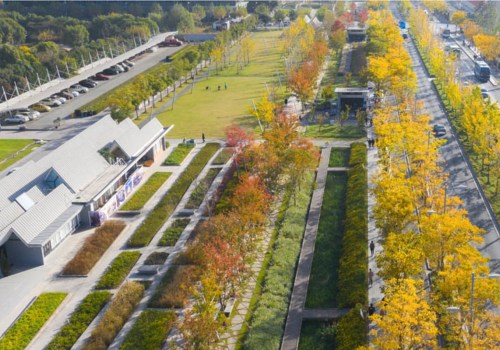Landscape engineering plays a crucial role in shaping outdoor environments, not only for aesthetic appeal but also for ecological and functional benefits. One of its most significant contributions lies in its impact on soil health, a foundational element of any sustainable landscape. By employing strategic design and innovative techniques, landscape engineers can enhance soil structure, fertility, and stability, creating resilient ecosystems that support plant growth, water management, and biodiversity. Understanding the benefits of landscape engineering on soil health highlights its importance in fostering healthier landscapes, mitigating environmental challenges, and promoting long-term sustainability.
Erosion Control and Soil Stability
One of the primary challenges in maintaining soil health is controlling erosion, which can deplete topsoil and diminish its fertility. Landscape engineering addresses this issue through techniques such as terracing, retaining walls, and vegetative buffers, which reduce water runoff and stabilize the soil. These methods not only prevent soil loss but also ensure that nutrients remain in place, fostering a fertile environment for plant life. Incorporating ground covers, shrubs, and other vegetation further enhances stability, as their root systems bind soil particles together. For properties with steep slopes or high erosion risks, engineered solutions create functional landscapes that resist degradation over time.
Improving Soil Drainage and Water Retention
Landscape engineering also enhances soil health by optimizing drainage and water retention. Poorly managed landscapes can lead to waterlogged soils or excessive runoff, both of which harm soil structure and plant life. By designing drainage systems such as swales, permeable surfaces, or rain gardens, engineers redirect water efficiently, preventing pooling and ensuring even distribution. These techniques improve water infiltration, helping the soil retain moisture while avoiding compaction and erosion. Proper water management also minimizes the risk of nutrient leaching, ensuring that essential minerals remain accessible to plants.
Enhancing Soil Fertility and Organic Matter
Through practices such as composting, mulching, and soil amendment, landscape engineering enriches soil fertility. Adding organic matter to the soil not only provides essential nutrients but also improves its texture and ability to retain moisture. Engineers often integrate natural solutions like composted materials or biochar to enhance microbial activity and foster a healthy soil ecosystem. By prioritizing soil enrichment, landscape engineering supports robust plant growth and ensures long-term productivity for gardens, parks, and agricultural spaces.
Supporting Biodiversity and Ecosystem Services
Healthy soil is the foundation of a thriving ecosystem, and landscape engineering promotes biodiversity by creating environments that support a variety of plant and animal life. Techniques such as habitat restoration, native planting, and wetland preservation enhance soil health by encouraging a balanced ecosystem. Biodiverse landscapes are more resilient to pests, diseases, and environmental stressors, creating a self-sustaining cycle that benefits soil and vegetation alike. The introduction of native plants, in particular, reduces the need for chemical fertilizers or pesticides, preserving the natural composition of the soil.
Reducing Urban Heat and Soil Degradation
In urban environments, landscape engineering helps combat soil degradation caused by construction, pollution, and the urban heat island effect. By incorporating green roofs, permeable pavements, and urban green spaces, engineers create conditions that protect and rejuvenate urban soils. Green roofs, for example, not only improve soil health on rooftops but also reduce heat absorption, benefiting the surrounding environment. Collaborations with experts like All County Roofing ensure that these solutions integrate seamlessly into urban designs, providing ecological and structural benefits simultaneously. These engineered landscapes contribute to cooler temperatures, cleaner air, and healthier soils in densely populated areas.
Mitigating Climate Change Effects on Soil
Climate change poses significant challenges to soil health, including increased drought, intense rainfall, and temperature fluctuations. Landscape engineering offers adaptive solutions that protect soil against these stresses. Techniques like rainwater harvesting, xeriscaping, and reforestation help regulate soil moisture levels, reduce erosion risks, and stabilize temperatures around the soil. By incorporating these practices, landscape engineers create environments that withstand climate variability while maintaining soil productivity and resilience.
Long-Term Benefits of Engineered Landscapes
The benefits of landscape engineering on soil health extend far beyond immediate results, offering long-term sustainability and ecological balance. Engineered landscapes require less intervention and maintenance over time, reducing costs and resource use. For example, by preventing erosion and improving fertility, these landscapes minimize the need for fertilizers, irrigation, or regrading. The integration of green infrastructure, such as bioswales or constructed wetlands, not only enhances soil health but also contributes to cleaner water systems and air quality.
Conclusion: A Sustainable Approach to Soil Health
Landscape engineering is a powerful tool for enhancing soil health, providing solutions that address erosion, fertility, drainage, and biodiversity. By integrating thoughtful design and natural processes, it creates landscapes that are both functional and ecologically sound. Whether in urban settings, agricultural fields, or residential properties, the benefits of landscape engineering ripple outward, improving not only soil health but also the overall sustainability of the environment. By collaborating with experts for integrated projects, property owners can create cohesive landscapes that balance aesthetics with environmental stewardship. Investing in landscape engineering is an investment in the health of the soil—and by extension, the health of the planet.







